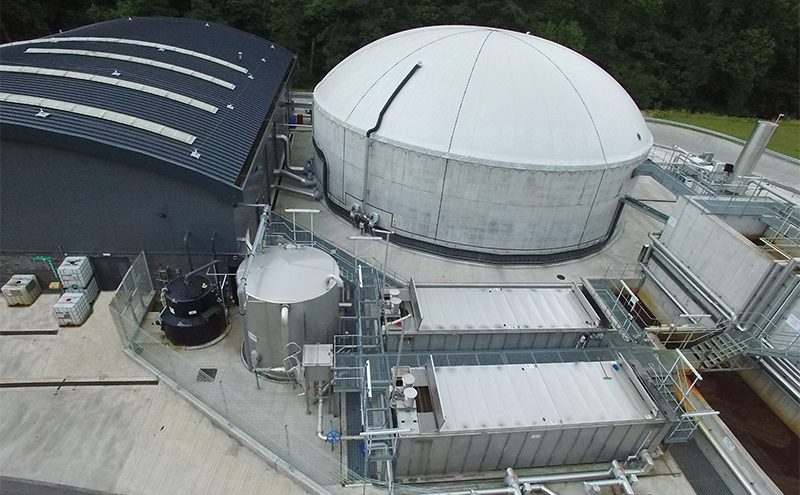Richard Gueterbock, MD of Clearfleau Group, offers advice and opinion on bio-waste.

During this summer’s extended heatwave, additional heat has been generated by Brexit infighting in Westminster and intransigence in Brussels. The resultant industrial policy vacuum means we have little idea of how our Government plans to motivate businesses to embrace the low carbon economy.
The bio-economy is a key strategic sector in Europe. To be part of it British companies must match the EU’s environmental standards. Working with our new German partners, water engineering company EnviroChemie, Clearfleau has excellent access to opportunities in the European industrial bio-energy sector. We also expect to see a growing British market for resource efficient water management and bio-energy solutions.
Sustainable manufacturing and a more circular approach to using resources is being driven by major multinationals, setting their own goals and targets while ignoring unhelpful politicians. Clearfleau is working with several global food and beverage companies to develop on-site bio-energy plants. Other opportunities range from European dairy companies to transatlantic distillers of rum and bourbon.
However, a sustained reduction in industrial emissions requires solutions for the smaller manufacturing businesses that are the drivers of future economic growth in the UK and across Europe. Investing in bio-energy offers an integrated solution, reducing carbon emissions and mitigating climate change.
Whether based on anaerobic digestion, biomass combustion or more advanced technologies, on-site bioenergy can generate decentralised energy from discarded materials. The UK will continue to rely on centralised generation for much of our electricity but many industrial businesses are already benefiting from investing in power (and heat) generation on their factory sites.
Manufacturing companies are showing an increasing interest in extracting value from process residues. This includes smaller dairy, meat, vegetable and fruit processing sites, although most industrial clients require a payback of under five years. While we are already working on projects where this is possible without incentives, there is potential to exploit other drivers that can enhance the payback once the current renewable energy incentives are no longer available.
Alongside escalating energy costs and pressure to reduce emissions, these drivers can include improved use of feedstock materials and re-using grey water. A recent report on water company performance (reported in Envirotec’s July edition) indicates that more effective water use must have higher priority.
Progression from watercourse discharge (the norm on our biogas plants) to re-use is a short step. As the food sector becomes more conscious of its water footprint, on-site treatment is part of the solution.
In recent weeks, water has not been the only commodity facing a restricted supply. A carbon dioxide shortage has affected supplies of meat, carbonated drinks and beer, and even crumpets. Anaerobic digestion can help provide a solution.
One of the co-products of anaerobic digestion is carbon dioxide (CO2) which comprises over 30% of the gas content of methane. At present CO2 is being extracted from biogas but not used on many AD plants – including one of our dairy sites. Only on very few sites is it replacing other supplies (often a by-product of nitrogen fertiliser production). CO2 from AD could help meet UK demand, replacing imports.
The biogas industry must curtail atmospheric release of CO2 and convert its carbon emissions into useful industrial grade CO2. Policy makers are trying to discourage use of feedstocks such as grass or maize in AD plants, which add to rural carbon emissions. Requiring AD plants to be carbon positive will help to make better use of the all the content of biogas, not just methane.
Energy supplies alone will not justify the future of AD in the bio-economy. We must promote the wider potential benefits from industrial biogas plants. Residues can be converted into novel ingredients as well as bio-energy, clean water and carbon dioxide for factory use. Residual nutrients (above all phosphorous – another resource in short supply) can help fertilise crops to be processed in the factory or fed to livestock that supply meat and milk, both of which have a high water and carbon footprint.
It is also time to stop harvesting crops that require high fertiliser inputs just to supply carbon-emitting AD plants. The bio-economy can help provide other scarce resources and the AD industry must be part of efforts to reduce emissions and make better use of all our natural resources.
We need leadership, not just from Government, but also from industry trade associations, to promote bio-energy as a part of a holistic solution to the issues of climate change and emissions reduction. It should not just be the biogas we value but other bio-engineered products that can be produced from residues and, above all, the inherent carbon efficiency of the process.
This is a sector in which British engineering skills can contribute to growth in the post-Brexit economy. Yet, in the UK and elsewhere there can be a correlation between ardent political support for isolationist polices and indifference to the future of our planet and the damage being done to our environment.
Ministers in BEIS and DEFRA should listen to British bio-engineering companies offering carbon-efficient technologies. They should indicate how they will support investment in decentralised bio-energy on factory sites to replace fossil fuels and, as in Scotland, put this at the core of future energy strategy.
Government must work with engineering companies and their trade associations to develop a policy framework for low carbon manufacturing after Brexit, so that British businesses can continue to trade in Europe and lead the future development of low carbon technologies. We need policy levers that will help British industry – from brewers to cheese makers and aviation to glass production – to embrace the circular economy and cut carbon emissions.
We would also like to see the current incentive regime for renewable heat and power extended beyond the 2020 cut-off date for smaller decentralised bio-energy systems that can supply clean energy and encourage carbon efficiency on smaller industrial sites, as well as reducing fossil fuel use in rural areas.







